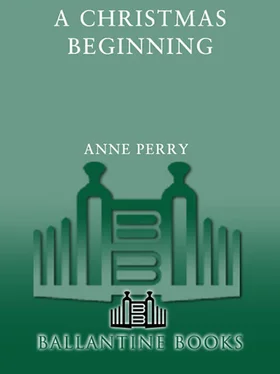“I did not tell her she lied,” he said quietly. “I said I believed she knew something relevant that she had not said. I think she is complaining so hard because that is true.”
“Don’t make it any worse!” Faraday begged. “Man, you are like a cart horse in the dining room. Just get out of it! God alone knows who killed Olivia Costain, but we aren’t going to find out your way.” His voice was rough with the edge of defeat. He must be hot standing in this room, so close to the fire, wearing his beautifully tailored jacket. It was of the best tweed, and cut with the casual elegance of one who does not need to impress.
And yet he did need to. The whole island was watching him, waiting for him to take away the burden of fear and tell them it was over, and justice would be done. And he had no idea how to do it, that much was clear to Runcorn, even if not yet to anyone else.
And begrudgingly, Runcorn felt sorry for him. Not much is expected of ordinary men. There is room for failure. It costs, but it is a familiar part of life. In the extraordinary, the men of Faraday’s privilege and office, it was crippling. The chief constable would not know how to deal with it. Nothing had prepared him for the bitterness or the shame of defeat. Probably all his life he had been expected to fill a certain mold, to win, to take pain or loss without complaint.
Did Faraday imagine that Melisande needed him to be faultless or she would not love him? Was that some legacy from his love of Olivia, or was it woven into his life and upbringing, inherited from his father, and his father before him? Did he think that if someone close to him, like a wife, were to know his weaknesses as well as his strengths, then they would use them to some kind of advantage, to manipulate or mock him?
No one can always be right. Every man has his flaws, the places where he is desperately vulnerable. Never to attempt anything that may cause pain, or defeat, is to be a coward at life. One loves those brave enough to try. Runcorn had seen women sometimes love the defeated far more tenderly, more passionately than the victor. To love is to protect, to nurture, to need, and in turn be needed.
How did he know that, and Faraday did not?
The silence had lengthened and Runcorn had not yet even tried to defend himself. “Then you had better look into the Costains yourself, sir,” he said aloud. “Because there is much that she knows but will not tell me.”
“Nonsense,” Faraday replied. “Thank you for your help, but it is not proving of any use. You are free to leave Anglesey whenever you wish. Good day.”
Runcorn was beyond the gates of the drive and into the road when Melisande caught up with him.
“Mr. Runcorn!”
He turned. They were level with the hedge now and hidden from the windows of the house. Maybe he would not see her many times more, certainly not alone. He stopped and faced her, trying to imprint on his mind every line of her brow, cheek, lips, the color and light of her eyes, so he would never forget.
“I heard Alan tell you to go,” she said anxiously. “He does not realize how his voice carries. Please don’t listen to him. He is frightened that none of us will solve this murder, and he will be blamed for that. He takes his responsibility very hard.”
“He doesn’t wish me to stay,” he pointed out.
“Does that matter?” she asked. “He needs you to, we all do. Someone killed Olivia and we cannot turn away from that as if it were some force of nature, and not one of us. We will suspect each other, until we know.”
“Do you know anything about the explorer she met about two years ago?” he asked. “Could she have loved him?”
She thought about it for several moments. “She never said anything to me, but then why should she? We spoke often. I liked her right from the first time we met, but we talked more of books, ideas, places, far more than of people we knew, and never of men.”
Another darker thought occurred to Runcorn, but he could not mention anything so indelicate to Melisande, much less suggest it of a woman who had been her friend. He felt the heat on his skin even as he pushed the idea from his mind, although he could not dismiss it altogether.
“Do you think it is something to do with Reverend Costain?” Melisande asked. “Is that why you spoke to Naomi so bluntly?” She was trying to read Runcorn’s face, perhaps judge from it what he was un-prepared to say.
“I think Mrs. Costain may be trying to protect both her husband and Olivia,” he replied, navigating a tenuous path between truth and lie. If Olivia were one of those rare women who prefer their own sex to the other, then it was an excellent reason why she would not wish to marry, and at the same time, it would be impossible for her to admit to it to anyone.
But what if someone had learned? Any man might feel unbearably betrayed to be rejected for another woman. It would be seen as the final insult. It would be unendurable if anyone else found out. Was that what the quarrel with John had been?
“Oh,” she said softly, sensing the movement of his thought. “You do not need to be so delicate with me. I am aware of such things, in women as well as in men. But I had no sense that it was so with her.”
Now the blood scorched up his face and he felt ridiculous. If Faraday, not to mention Barclay, knew that he had even entertained such a thought in Melisande’s presence, let alone discussed it with her, they would be appalled.
She was smiling, a flicker of real amusement in her eyes. “I liked Olivia,” she told him. “I felt comfortable with her, and very free to be honest, perhaps not only with her but with myself. And that is not always true for me. If I can bear the way she died, and think of the brutality, and the passion that caused it, then surely I can look at a little human frailty without turning away with thought only for myself? She deserved better than that of me. Moral queasiness is rather a cheap escape, don’t you think?”
He looked at her, and for a moment the pity and the honesty in her face made her infinitely beautiful to him. Faraday, with his lumbering imagination and his simplistic judgments, was a clod, bitterly unworthy of her.
He wondered again if she knew that Faraday had once courted Olivia also? Should he tell her? Was it just a grubby and horribly obvious attempt to spoil her happiness because he envied any man who could spend time in her company, let alone marry her? Or was it the only real honesty, because Faraday might be involved in Olivia’s death?
He had no idea. The only answer would be to learn more about Faraday and then judge what to say. It must be the truth, and it must be fair. It was Melisande’s safety that mattered, not whether she liked Runcorn’s actions and certainly not whether Faraday did.
His face was still hot as he crafted his reply. “I don’t like finding weaknesses in people, even if they help to solve a crime, but I can’t afford to ignore them or lie to myself or others. I would like to have protected you from having to think of this.”
“Thank you, Mr. Runcorn,” she acknowledged. “I do not wish to be protected from life. I think we might miss a great deal more of the good, and the bad would find us anyway. At least the sense of emptiness would. I think I would rather eat something unpleasant now and then, than perish of starvation sitting at the table because I was afraid to try. Please find out what really happened to Olivia.” She turned and walked away before he could find the words to answer her, and repeat his promise.

He had no choice now but to look more deeply into Faraday’s life and character. He began where Miss Mendlicott had ended and, through conventional methods, was able to look up the man’s days in Cardiff University where he was moderately successful in gaining a degree in history, even though he did not need to earn his living by it. He had traveled in Europe on and off for a year or two in all the expected places. He did not see Venice or Capri. He did not venture as far as Athens, which Runcorn had read about, and would have leapt at the chance to see. He did not visit the beautiful city of Barcelona, named after Hannibal Barca, who had crossed the Alps with elephants, to attack Rome, before the days of Julius Caesar. That was one history lesson from school days that had fired Runcorn’s imagination and he had never forgotten it.
Читать дальше











